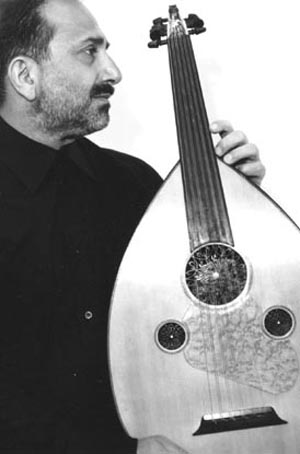

Al-Oud - the oriental lute
The Arab instrument Al-Oud, is the predecessor of the European lute. In the musical tradition of the orient, it occupies a similar importance as the piano in the west.
The oriental lute already existed in the 10th century A.D. as it is described in a book of the arabic scientist Al-Farabi. It seems that the Oud is much older. Lutes existed also in ancient Mesopotamia and Egypt. In arabic music the oud has been used mainly to accompany songs.
During the crusades the Oud came first to Spain and then to other parts of Europe. The name "Al-Oud" which means "wood" changed into "Laute", "luth" etc.
The oud is without frets and had until the 9th century only four strings. The famous musician and music scientist Ziryab added a fifth string. Today the oud has double strings.